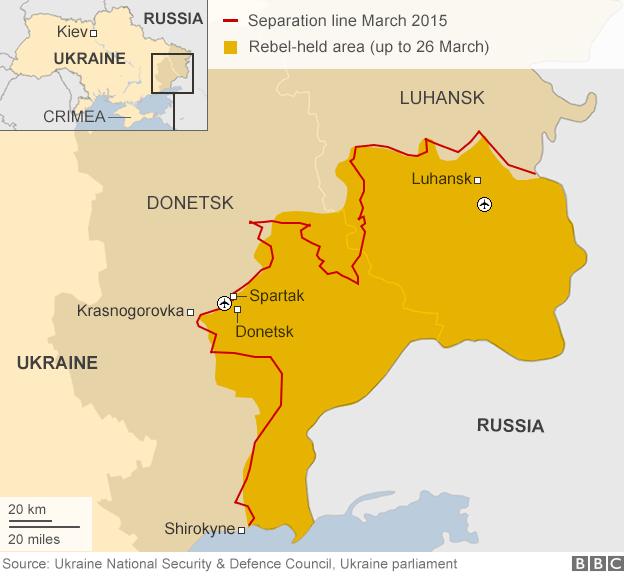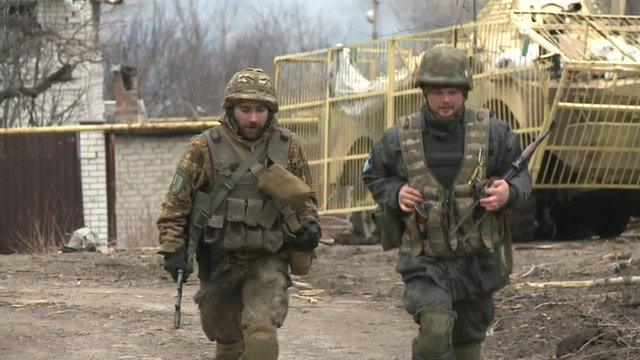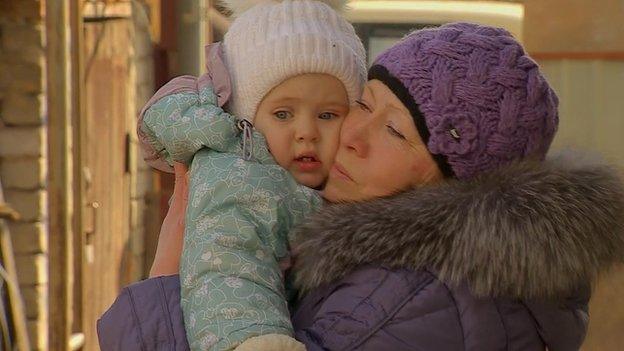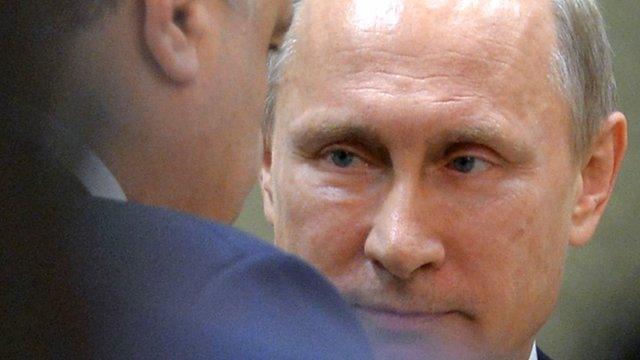Ukraine prospects for peace: People on the edge of war
- Published
It has been more than a month since a deal was reached to end the conflict in eastern Ukraine.
Fighting there has claimed some 6,000 lives and left more than a million people without homes since it began in early 2014.
The BBC's Natalia Antelava and Abdujalil Abdurasulov have been meeting people in areas affected by the fighting as they examine how successful the truce has been.




Luhansk - rebel held territory
The city of Luhansk, one of the strongholds of pro-Russian rebels, has seen some of the fiercest battles.
After Ukrainian troops withdrew and fighting died down the rebels declared it the People's Republic of Luhansk.
The BBC's team spoke to some of the people living in the city to find out how life there is now.
Among them were a 21-year-old former drama student, now volunteering to fight for the rebels, and a woman at a flea market in the city who said: "There is nothing for anyone here."
Life in Luhansk after 'independence'
Because the conflict is so steeped in differing cultural ideologies and identities, many ordinary people have volunteered to join the fight either in support of the national government or the pro-Russia separatists.
The BBC News team visited a children's rehabilitation centre in Luhansk that provides shelter to youngsters whose parents either died in the war or are still fighting.
They met one girl who asked as soon as she arrived at the centre: "Where will we hide if we are scared?"
Natalia Antelava visits a children's centre for youngsters involved in the war in eastern Ukraine

Donetsk - rebel held territory
The crisis in eastern Ukraine has heightened tensions between Western nations and Russia.
One of the worst battles of the conflict so far has been around Donetsk airport, now destroyed after months of bitter fighting.
When the journalists took a ride with a rebel battalion patrolling the area - just 1km from the Ukrainian forces' position - one fighter told them that the US was his main enemy.
He showed the BBC's Natalia Antelava a tank he claimed had been supplied by the US - but she was able to inspect it and conclude it was Ukrainian.
The fighter was happy, however, to show our correspondent his own piece of American weaponry.
Riding with Ukraine's rebels
Arriving in the city of Donetsk, the team met a woman still living in the basement of a shelled and abandoned apartment block in the city's suburbs.
She told them why she wanted to break away from Kiev and be part of Russia.
Natalia Antelava meets a woman living in an abandoned, shelled apartment block in the suburbs of Donetsk

Ukrainian-controlled territory
Since the beginning of the Ukraine conflict, both pro-Russian rebels and Ukrainian forces have relied heavily on drones for surveillance and reconnaissance.
Travelling to the town of Krasnogorovka, the BBC's team met Ukrainian volunteers on a drone reconnaissance mission into rebel-held Donetsk.
Two Ukrainian volunteers on a drone reconnaissance mission into the rebel-held Donetsk
And as their journey continued, they meet a villager still living by the front line.
The woman spends her days among bombed-out buildings and empty homes, with the sound of gunfire a part of daily life.
Natalia Antelava meets a villager still living on Ukraine's front line

On the line
When Ukraine and Russia-backed rebels signed a ceasefire deal in Minsk in February, they agreed to withdraw heavy weapons, creating a separation line between the two sides.
Natalia Antelava and Abdujalil Abdurasulov travelled to Shirokyne, on the ceasefire line, with international observers watching the implementation of the truce.
From there, they went to the border with Russia, which Ukraine is due to regain control of under the truce. It wants to stop what it says is the flow of Russian troops and military vehicles into the country.
Russia denies accusations of sending troops and supplying the rebels.
Alexander Hug, deputy chief monitor of the Organization for Security and Co-operation in Europe (OSCE), said the observers had not been granted the access they needed to the border.
He spoke to Gen Alexander Lencov, deputy commander of the ground forces of the Russian Army, who said he was not aware of any problems.
The BBC spends time with international observers from the OSCE who are monitoring the implementation of the ceasefire in Ukraine.
- Published20 March 2015

- Published18 March 2015

- Published12 February 2015
